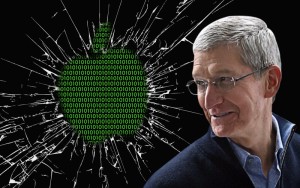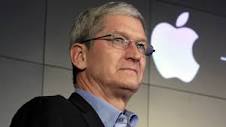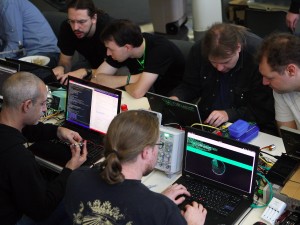Apple CEO Tim Cook declared on Wednesday that his company wouldn’t comply with a government search warrant to unlock an iPhone used by one of the San Bernardino killers, a significant escalation in a long-running debate between technology companies and the government over access to people’s electronically-stored private information.
But in a similar case in New York last year, Apple acknowledged that it could extract such data if it wanted to. And according to prosecutors in that case, Apple has unlocked phones for authorities at least 70 times since 2008. (Apple doesn’t dispute this figure.)
In other words, Apple’s stance in the San Bernardino case may not be quite the principled defense that Cook claims it is. In fact, it may have as much to do with public relations as it does with warding off what Cook called “an unprecedented step which threatens the security of our customers.”
For its part, the government’s public position isn’t clear cut, either. U.S. officials insist that they cannot get past a security feature on the shooter’s iPhone that locks out anyone who doesn’t know its unique password—which even Apple doesn’t have. But in that New York case, a government attorney acknowledged that one U.S. law enforcement agency has already developed the technology to crack at least some iPhones, without the assistance from Apple that officials are demanding now.
The facts in the New York case, which involve a self-confessed methamphetamine dealer and not a notorious terrorist, tend to undermine some of the core claims being made by both Apple and the government in a dispute with profound implications for privacy and criminal investigations beyond the San Bernardino case.
In New York, as in California, Apple is refusing to bypass the passcode feature now found on many iPhones.
But in a legal brief, Apple acknowledged that the phone in the meth case was running version 7 of the iPhone operating system, which means the company can access it. “For these devices, Apple has the technical ability to extract certain categories of unencrypted data from a passcode locked iOS device,” the company said in a court brief.
Whether the extraction would be successful depended on whether the phone was “in good working order,” Apple said, noting that the company hadn’t inspected the phone yet. But as a general matter, yes, Apple could crack the iPhone for the government. And, two technical experts told The Daily Beast, the company could do so with the phone used by deceased San Bernardino shooter, Syed Rizwan Farook, a model 5C. It was running version 9 of the operating system.
Still, Apple argued in the New York case, it shouldn’t have to, because “forcing Apple to extract data… absent clear legal authority to do so, could threaten the trust between Apple and its customers and substantially tarnish the Apple brand,” the company said, putting forth an argument that didn’t explain why it was willing to comply with court orders in other cases.
“This reputational harm could have a longer term economic impact beyond the mere cost of performing the single extraction at issue,” Apple said.
Apple’s argument in New York struck one former NSA lawyer as a telling admission: that its business reputation is now an essential factor in deciding whether to hand over customer information.
“I think Apple did itself a huge disservice,” Susan Hennessey, who was an attorney in the Office of the General Counsel at the NSA, told The Daily Beast. The company acknowledged that it had the technical capacity to unlock the phone, but “objected anyway on reputational grounds,” Hennessey said. Its arguments were at odds with each other, especially in light of Apple’s previous compliance with so many court orders.
It wasn’t until after the revelations of former NSA contractor Edward Snowden that Apple began to position itself so forcefully as a guardian of privacy protection in the face of a vast government surveillance apparatus. Perhaps Apple was taken aback by the scale of NSA spying that Snowden revealed. Or perhaps it was embarassed by its own role in it. The company, since 2012, had been providing its customers’ information to the FBI and the NSA via the PRISM program, which operated pursuant to court orders.
Apple has also argued, then and now, that the government is overstepping the authority of the All Writs Act, an 18th-century statute that it claims forces Apple to conduct court-ordered iPhone searches. That’s where the “clear legal authority” question comes into play.
But that, too, is a subjective question which will have to be decided by higher courts. For now, Apple is resisting the government on multiple grounds, and putting its reputation as a bastion of consumer protection front and center in the fight.
None of this has stopped the government from trying to crack the iPhone, a fact that emerged unexpectedly in the New York case. In a brief exchange with attorneys during a hearing in October, Judge James Orenstein said he’d found testimony in another case that the Homeland Security Department “is in possession of technology that would allow its forensic technicians to override the pass codes security feature on the subject iPhone and obtain the data contained therein.”
That revelation, which went unreported in the press at the time, seemed to undercut the government’s central argument that it needed Apple to unlock a protected iPhone.
“Even if [Homeland Security] agents did not have the defendant’s pass code, they would nevertheless have been able to obtain the records stored in the subject iPhone using specialized software,” the judge said. “Once the device is unlocked, all records in it can be accessed and copied.”
A government attorney affirmed that he was aware of the tool. However, it applied only to one update of version 8 of the iPhone operating system—specifically, 8.1.2. The government couldn’t unlock all iPhones, but just phones with that software running.
Still, it made the judge question whether other government agencies weren’t also trying to break the iPhone’s supposedly unbreakable protections. And if so, why should he order the company to help?
There was, the judge told the government lawyer, “the possibility that on the intel side, the government has this capability. I would be surprised if you would say it in open court one way or the other.”
Orenstein was referring to the intelligence agencies, such as the NSA, which develop tools and techniques to hack popular operating systems, and have been particularly interested for years in trying to get into Apple products, according to documents leaked by Snowden.
There was no further explanation of how Homeland Security developed the tool, and whether it was widely used. A department spokesperson declined to comment “on specific law enforcement techniques.” But the case had nevertheless demonstrated that, at least in some cases, the government can, and has, managed to get around the very wall that it now claims impedes lawful criminal investigations.
The showdown between Apple and the FBI will almost certainly not be settled soon. The company is expected to file new legal briefs within days. And the question of whether the All Writs Act applies in such cases is destined for an appeals court decision, legal experts have said.
But for the moment, it appears that the only thing certainly standing in the way of Apple complying with the government is its decision not to. And for its part, the government must be presumed to be searching for new ways to get the information it wants.
Technically, Apple probably can find a way to extract the information that the government wants from the San Bernardino shooter’s phone, Christopher Soghoian, the principal technologist for the American Civil Liberties Union, told The Daily Beast.
“The question is, does the law give the government the ability to force Apple to create new code?” he said. “Engineers have to sit down and create something that doesn’t exist” in order to meet the government’s demands. Soghoian noted that this would only be possible in the San Bernardino case because the shooter was using an iPhone model 5C, and that newer hardware versions would be much harder for Apple to bypass.
But even that’s in dispute, according to another expert’s analysis. Dan Guido, a self-described hacker and CEO of the cybersecurity company Trail of Bits, said that Apple can, in fact, eliminate the protections that keep law enforcement authorities from trying to break into the iPhone with a so-called brute force attack, using a computer to make millions of password guesses in a short period of time. New iPhones have a feature that stops users from making repeated incorrect guesses and can trigger a kind of self-destruct mechanism, erasing all the phone’s contents, after too many failed attempts.
In a detailed blog post, Guido described how Apple could work around its own protections and effectively disarm the security protections. It wouldn’t be trivial. But it’s feasible, he said, even for the newest versions of the iPhone, which, unlike the ones in the New York and San Bernardino cases, Apple swears it cannot crack.
“The burden placed on Apple will be greater… but it will not be impossible,” Guido told The Daily Beast.




